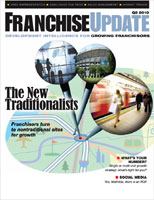How Much Can I Make?: Answering a Candidate's Most Probing Question--Legally!
1. Should I make a financial performance representation (FPR)?
Yes! Any type of representation, oral, written, or visual, that suggests or implies a specific level or range of actual or potential sales, income, gross or net profits qualifies as an FPR. You can't make an FPR unless it is in your franchise disclosure document (FDD). Between 20 and 30 percent of all franchisors make an FPR, which means some of your competitors share their numbers with your prospects. What impression do you leave if you don't share yours? If you have solid numbers, consider making an historical-based FPR. If you do, the law allows you to make specific written representations outside the FDD about a particular location or highlighting specific variables (e.g., a kiosk variation to a traditional retail format). Without an FPR, you may not make financial representations on your website (the first place prospects check in investigating a concept) or anywhere else.
2. Must I provide prospects with an FPR?
No, but you can't tell prospects that the law forbids you from sharing information about sales, income, earnings, or profits. That's illegal.
3. May I provide actual operating results of franchisee or company units if I don't include an FPR in my FDD?
No. You may not advertise "Earn $50,000 a month" or otherwise suggest or imply actual, likely, or possible results unless your FDD includes an FPR. "Earn enough money to buy a Porsche" is an FPR. It does not matter that the information is true.
4. How can I communicate the "value" of my franchise opportunity if I don't make an FPR?
It depends on what you want to say. You may tell prospects what their operating costs may be if you don't suggest net results. (Okay: "Our purchasing power can shave 10 percent off your inventory costs." Not okay: "Our purchasing power will boost net profits by 5 percent.")
5. Is it risky to offer prospects projections?
Absolutely. Franchisors should not make projections, at least not without the blessing of an outside CPA. Projections invite complaints from franchisees who fail to achieve predicted results. Given the heightened liability risks, franchisors making legitimate FPRs today do so based on actual, historical results.
6. What if I sell a company unit?
FPR rules do not apply when you show the books and records of a company or affiliate location being offered for sale to a prospective buyer who will operate it as a franchise. Be careful. You may only share results with bona fide buyers of that unit, not other prospects. No wink, wink.
7. Can I be liable for making an FPR based on historical results of franchise units if the data reported to me turns out to be false?
No, not if you had no reason to know the data was false. You have no duty to audit franchisee-supplied data. Your FPR should disclose that you have not audited data reported by franchisees.
8. What can I tell prospects if I don't make an FPR?
- Operating costs, as long as you do not suggest net results. FDD Item 7 amplified by robust footnotes also offers prospects detailed cost data on which they can base their own business plan.
- Number of units sold (if you don't connect the information to price per unit).
- Amount of raw materials (e.g., gallons of ice cream used per week).
- Inventory costs and turns in a given period (useful for retail concepts).
- Number of customers served and comparable usage data (useful for hair salons, fitness concepts, and training programs).
- Market share figures (showing brand strength).
- Encourage them to talk with existing franchisees, but don't steer prospects to high-fliers and away from poor performers. (It's okay to direct prospects to franchisees serving similar markets or owning units with specific characteristics.)
- It is okay to give prospects a blank pro forma if you do not tell them how to fill in the blanks. (Explain this to your sales team!)
How you sell franchises is regulated by common law fraud and unfair trade practice laws. It is unlawful to make false or deceptive statements to induce someone to buy a franchise, even if you don't make an FPR.
9. Do disclosure rules dictate certain information that must be in my FPR?
There are certain mandatory requirements, but overall, disclosure rules let companies be creative. Whatever you do, explain your data and assumptions in footnotes. The more notes, the better (leave nothing to guesswork). An FPR is not a "Get out of jail free" card! Some data is easier to disclose than other data (historical sales is easy; bottom-line results is not). You may confine net results to major expense categories like rent, labor, and cost of goods sold. If you disclose averages, you must disclose the percentage of units meeting or exceeding the average. You may confine data to units having a minimum operating history (e.g., 2 years) to avoid disclosing ramp-up period results. It is okay to confine data to units in specific geographic regions and segregate information based on size or type of units or locations. Do not base an FPR exclusively on company units if you have franchisee units that meet your criteria, but it is okay to do so if you have no franchisee units that meet your criteria (this lets start-up franchisors make FPRs). Bottom line: you must have a reasonable basis for the claim, a loose legal standard that requires typicality. Exclude atypical units (based on venue type, size, or other variables), and explain by footnote why you've excluded them. Do your homework. Draw ideas not only from your competitors' FPRs, but from leading franchisors. Don't make an FPR or supplemental representation without having your franchise attorney review it first!
10. Am I responsible if my sales team makes an FPR?
An FPR imposes discipline on your sales team when pitching your program to prospects. Without an FPR, you ask them to dance around your prospect's most probing financial questions. The law holds you accountable for things your brokers and employees tell prospects unless they knowingly violate your "No FPR" policy. To prevent unauthorized FPRs, have prospects acknowledge at the franchise sales closing that they received no information from anyone representing your company about actual or projected sales, income, gross or net profits, break-evens, or comparable data. A signed acknowledgement is powerful evidence if a dispute arises later that a rogue salesperson made financial promises during the sales process. You'll have a defense to liability if you can show the rogue salesperson knew better by demonstrating how you communicated your "No FPR" policy.
Rochelle Spandorf is a partner with Davis Wright Tremaine LLP and a California State Bar Certified Specialist in Franchise and Distribution Law. Based in the firm's Los Angeles office, she is a nationally recognized business franchise and distribution attorney with more than 30 years of experience representing franchisors, manufacturers, licensors, suppliers, franchisees, and distributors in their domestic and international expansion and strategic development. She can be reached at [email protected].
Share this Feature
Recommended Reading:
FRANCHISE TOPICS
- Multi-Unit Franchising
- Get Started in Franchising
- Franchise Growth
- Franchise Operations
- Open New Units
- Franchise Leadership
- Franchise Marketing
- Technology
- Franchise Law
- Franchise Awards
- Franchise Rankings
- Franchise Trends
- Franchise Development
- Featured Franchise Stories
FEATURED IN

Franchise Update Magazine: Issue 2, 2010








 The franchise listed above are not related to or endorsed by Franchise Update or Franchise Update Media Group. We are not engaged in, supporting, or endorsing any specific franchise, business opportunity, company or individual. No statement in this site is to be construed as a recommendation. We encourage prospective franchise buyers to perform extensive due diligence when considering a franchise opportunity.
The franchise listed above are not related to or endorsed by Franchise Update or Franchise Update Media Group. We are not engaged in, supporting, or endorsing any specific franchise, business opportunity, company or individual. No statement in this site is to be construed as a recommendation. We encourage prospective franchise buyers to perform extensive due diligence when considering a franchise opportunity.